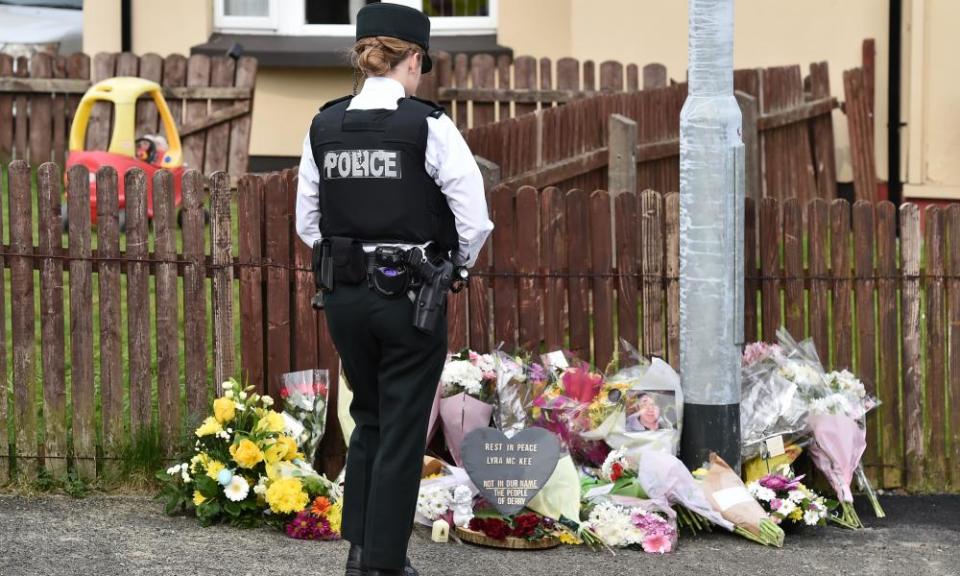Lyra McKee killing: why Derry never saw a peace dividend

The author and journalist Lyra McKee in 2016 wrote an essay about young people in Northern Ireland that turned out to be poignant and prophetic. “We were the Good Friday agreement generation, destined to never witness the horrors of war but to reap the spoils of peace,” she wrote. “The spoils just never seemed to reach us.”
Those lines tolled with sombre resonance after McKee, 29, was shot dead on Thursday night while covering a riot in Derry.
What more brutal way to illustrate her point than to lose her life, have her singular voice silenced, on the 21st anniversary of the agreement that was supposed to draw a line under the Troubles. There is an even more tragic twist.
McKee could just as well have been writing about her killer. If there is a corner of Northern Ireland that has yet to reap crumbs from the peace, it is the Creggan. A housing estate that sprawls over a hillside outside Derry’s medieval walls, its name means stony place, an apt description of one of the most deprived areas in the United Kingdom. Here almost two-thirds of children are born into poverty. Many grow up angry and alienated – fertile soil for dissident republicans.
“They’ve no hope. They get sucked into paramilitarism, they get chucked into crap,” said Sharon McCloskey, 49, part of a crowd of residents gathered on Fanad Drive, where McKee was shot. A growing pile of bouquets marked the spot. Cali Morrow, 42, agreed. “They’re easy targets.”
Hours earlier on Saturday, police had arrested two men, aged 18 and 19, in connection with McKee’s murder. Police believe that both are members of the New IRA, said Det Supt Jason Murphy. “My broader concern is that we’re seeing a new breed of terrorists coming through the ranks.”
Related: Lyra McKee killing: 'New breed of terrorism' in Northern Ireland, says PSNI
Ireland’s justice minister, Charlie Flanagan, on Friday warned of the “dangerous radicalisation” of young people.
It is no coincidence that the New IRA, which emerged in 2012 via a merger of dissident groups opposed to the peace process, gained a foothold in Derry.
When the then United States president, Bill Clinton, visited the city in 1995 there was euphoria. The Provisional IRA had declared a ceasefire and there was talk of a peace agreement and an economic dividend.
The agreement came in 1998 and parts of Northern Ireland subsequently thrived, including areas around Belfast that now boast tech companies, new hotels and redeveloped business offices.
Derry, Northern Ireland’s second city, is still awaiting the dividend – the “spoils”, as McKee put it.

Tributes to McKee near the scene of her shooting.Photograph: Charles McQuillan/Getty
“That paragraph Lyra wrote is just so apt,” said Kathleen Bradley, 38, a community activist and friend of the writer. “The dividend of peace should have reached down. It didn’t.”
The statistics are sobering. Despite some excellent schools and a vibrant cultural scene, Derry ranked last in a 2017 Pricewaterhouse report on the economic health of 57 UK cities.
The number of children removed from family homes because of neglect in Derry hit a record high point last year. In a survey, 95% of young people questioned said that they saw no future in the city.
“Derry is an economic outlier – suffering from a level of financial and social deprivation that is quite unique within Northern Ireland,” Steve Bradley, a regeneration consultant, wrote in an analysis last year.
Stephen Mallett, a youth community organiser in Creggan, said young people used to find temporary work in London and return flush – for a while – with cash. But the work dried up and London became too expensive, so now young people feel marooned. “Abject poverty, no way out, that’s how they feel,” he said.
The New IRA and Saoradh, a political party that reflects its thinking, exploited this vulnerability, said Mallett.
In an interview in Dublin last month, Saoradh’s chairman, Brian Kenna, put it another way. The party, he said, was offering a radical alternative to people who had been failed by capitalism and the Irish and British governments.
Republican socialist ideology was incentivising recruits, said Kenna. “Young people are now getting involved in an armed campaign without a personal experience of oppression.”
McKee’s murder, however, has created a backlash against the New IRA. Residents in Creggan expressed contempt for the masked gunman who shot McKee – he was captured on security cameras and mobile phones – and for those who are believed to have orchestrated the riot.
“It made me ashamed to be called a Creggan man,” said one 39-year-old man, who lives near the scene of the shooting. “A girl with her whole life ahead of her, dead.
“The shooter is not a republican in my eyes. He’s a yobbo, a hood, a criminal.”
Overnight a wall that had borne the slogan “IRA undefeated army, unfinished revolution” was edited by someone with a paint brush. It now reads: “IRA defeated army, finished revolution.”

 Yahoo News
Yahoo News 
